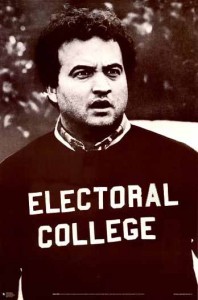Regular as clockwork, every four years, we get calls for scrapping that archaic relic of the 18th century, the Electoral College. An institution unique to the U.S. political system, the EC takes a beating for occasionally producing a president who was not elected by a majority of the voters.
The issue is timely, because Virginia is considering a change in the way it allocates its Electoral College votes, and some conservative groups are salivating that this change, if emulated in other states, could enhance Republican presidential prospects. Their “evidence” is that if this change had been in effect in only five states, Mitt Romney would have won the election last year
What is this “silver bullet” of reform, and what would be its real world effects? Let’s take a closer look.
Virginia has 13 votes in the Electoral College, one for each congressional district, and two for the state’s two Senators. Right now, those 13 votes all go to the candidate that receives the most votes state-wide. In the last election, Barack Obama received 51% of the popular vote, and all of the 13 Electoral College votes.
State Senator Bill Carrico has proposed legislation, which has now cleared committee and is heading towards the floor, which would allocate the Electoral College vote by congressional district, with the two extra votes going to the winner of the most congressional districts. In 2012, that would have meant Obama getting only four Electoral College votes while Romney, who won seven of the state’s congressional districts, would have gotten nine.
The allocation of Electoral College votes is a matter of state law, and in fact there are two states – Maine and Nebraska – which already allocate their Electoral College votes along the lines of the Virginia proposal. In 2008, in fact, Nebraska awarded four of its five EC votes to John McCain, but Obama, who ran strongly in the Omaha area, received one EC vote for that congressional district.
It’s easy to cherry-pick states where allocation by congressional district would have changed the Electoral College tallies, but change doesn’t take place in a vacuum. The election was held under the current rules, and if the rules had been different, the campaign would have been run differently, and no one can predict with certainty the result. The proposed change would have benefited the Republican candidate in 2012, but it isn’t hard to find an example cutting the other way.
Consider Utah (where I live). The reddest of red states, Utah awarded its six electoral votes to ‘favorite Mormon son” Mitt Romney, of course. Utah is so Republican that neither candidate bothered to campaign there (though both of them blew through on fund-raising trips). No matter how much time and money Obama might have spent in Utah, those six EC votes were going to Romney; no matter how little time and money Romney spent in Utah, he was assured of those votes.
But suppose this Virginia plan had been in effect in Utah. Salt Lake County is almost equally divided between Republicans and Democrats. If Obama had been able to win the 4th Congressional District, he would have picked up an Electoral College vote from Utah. Could he have won it with an aggressive campaign? Possibly. After all, Democrat Jim Matheson did win the congressional seat in that district. (Yeah, I know. Obama only got 30% of the vote in the 4th, but sooner or later the Republicans in Utah will “pack” all the Democrats into one district, and then that district will be available to a Democratic presidential candidate.)
And we don’t have to speculate on Utah’s future to find a real example. Kentucky gave 60% of its popular vote to Romney, but the Bluegrass State’s 3rd Congressional District gave 56% of its vote to Obama, giving him an EC vote under the Carrico reform.
The point is, perhaps, that we can’t know for sure how this kind of tinkering will play out in the real world. It’s easy to see that such a change would benefit the Republicans in blue state California (Romney would have won 10 EC votes), but it should also be easy to see that it would benefit the Democrats in red state Texas (Obama would have won eight).
The Carrico proposal, if adopted nation-wide, would more closely align the Electoral College with the popular vote result, and – except under extraordinary circumstance — completely eliminate the kind of aberration we saw in 2000, when Al Gore lost the EC while winning more popular votes than George Bush. But it would not change the fact that the presidency cannot be a proportional vote institution. Those voting for the losing candidate, no matter what the system, are not going to be represented at the presidential level. They are going to have to look to other governmental institutions – the House of Representatives and the Senate – to protect their interests.
No system of representation is perfect. Carrico-like “reforms” might temporarily provide extra clout to his rural constituency. But they are steps on the road to elimination of the Electoral College and its replacement with a national popular vote. And that step would deliver the presidency permanently into the hands of big city political machines, as massive population centers swamped the more sparsely populated states – like Virginia.
And that would not be good for Senator Carrico’s rural constituency.
There are other proposals for Electoral College reform – and “reform” – floating around. I’ll have more to say about some of them in the future.
– – – – – – – – – –
Gordon S. Jones is a senior fellow at Frontiers of Freedom. Jones is also an adjunct professor at Utah Valley University and Salt Lake Community College. Jones has extensive experience in Congress, in public policy, and elective politics.

